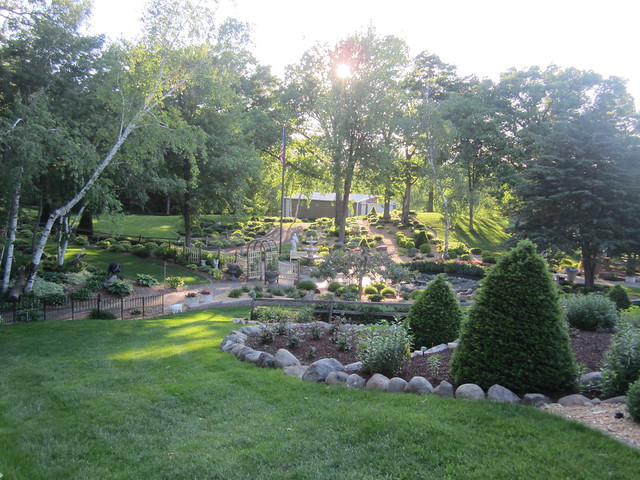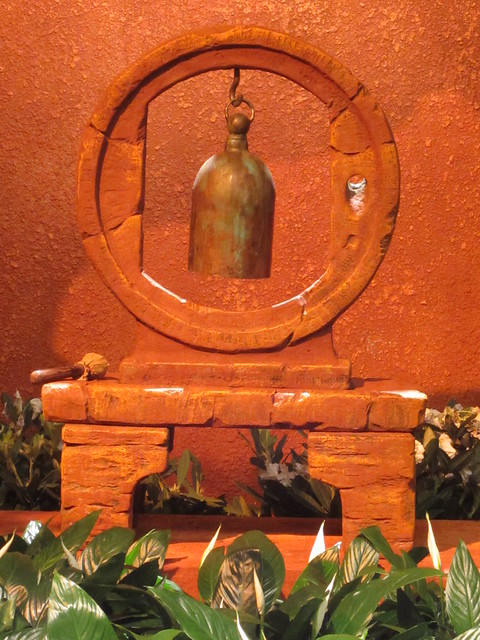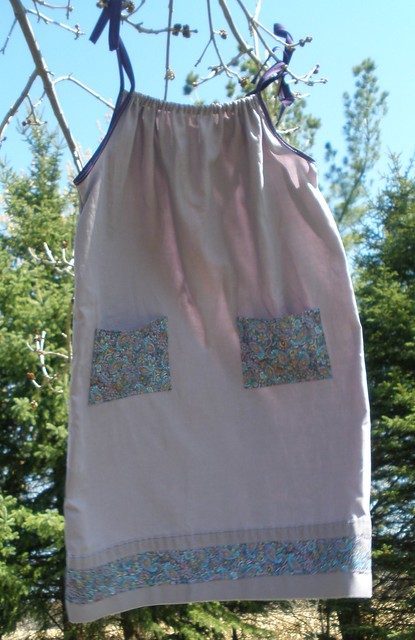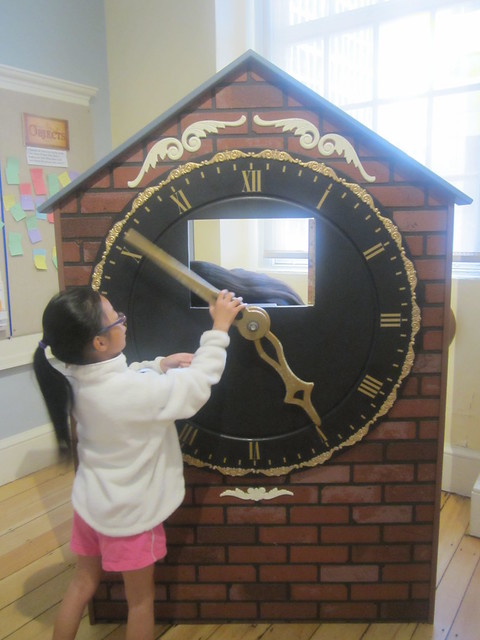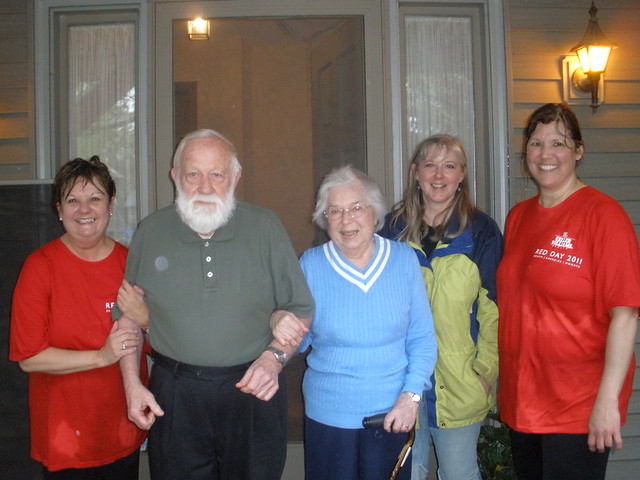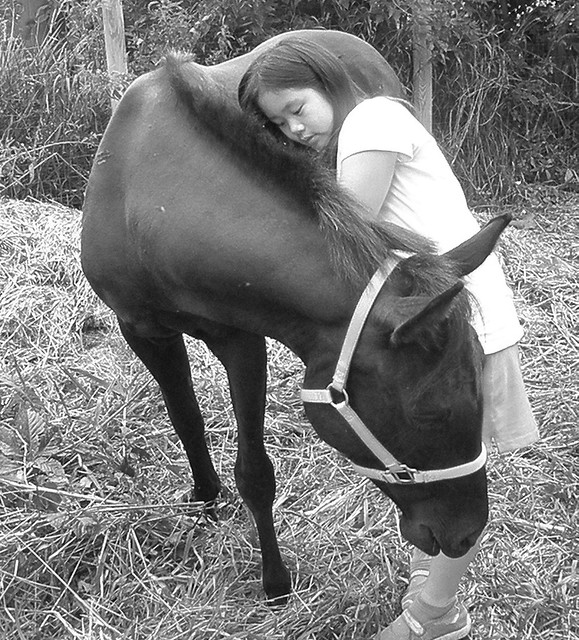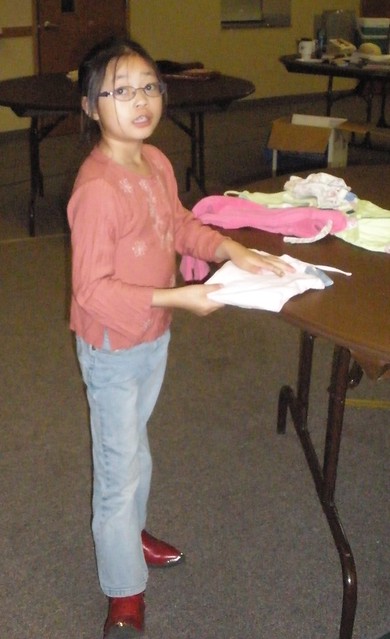This is the third focus of the "Spiritual Practices A to Z" challenge that I'm doing that is based on the spiritual practices that are shared on the
Spirituality & Practice website. So far I have focused on Attention and Beauty. For the past two weeks, I focused on the spiritual practice of Compassion.
Sophia helping Darlene frost and decorate cookies
for Valentine's Day at the nursing home.
(Taken on February 13, 2015)
Spiritual Practice: Compassion
Enhances: Caring
Balances/Counters: Judgment, Pain
The Basic Practice
Compassion is a feeling deep within ourselves and a way of acting — being affected by the suffering of others and moving on their behalf. Buddha and Jesus are the two most well-known exemplars of compassion, and it is the central ethical virtue in the two religions that developed from their teachings.
Olivia helping Annabelle at the Valentine's Day
cookie decorating activity at
the nursing home on February 13, 2015.
As the Spiritual Practices website said, "The spiritual practice of compassion is often likened to opening the heart. First, allow yourself to be feel the suffering in the world, including your own. Don't turn away from pain; move toward it with caring. Go into situations where people are hurting. Identify with your neighbors in their distress. Then expand the circle of your compassion to include other creatures, nature, and the inanimate world."
Sophia tuning her harp in preparation for
our time at Northwoods Humane Society.
We are starting to do music therapy for the animals
who are waiting to be adopted there
which has been very rewarding.
This is Bridgett listening to Sophia.
(February 13, 2015.)
Why This Practice May Be For You
The practice of compassion increases our capacity to care. It reinforces empathy, sympathy, and charity.
On May 12, 2011, over 30 volunteers from
Keller Williams in Maple Grove came to
my parents home to help them with outdoor work
as well as making their home safe indoors.
This was for their annual Red Day (volunteer day).
The volunteers had such great attitudes and
worked through the pouring rain.
My parents are so happy - and thankful - that they were chosen to
receive all the help and improvements to their home.
Why were they selected?
Keller Williams was looking for families
who have made a difference in the community.
My dad was in the very advanced stages of Alzheimer's Disease, and
my mom had significant mobility and other health issues.
However, when you move toward others with compassion, you are likely to encounter some common attitudes that want you to close your heart again. The usual suspects are judgment and all its associated "isms": ageism, classism, racism, sexism, and nationalism.
On a personal level, your compassion is sabotaged by feelings of ill will toward others: malice and spite. These feelings, and others arising out of personal pain and emotional wounds, are actually symptoms indicating that you need to have compassion for yourself.
Quotes
Compassion is a foundation for sharing our aliveness and
building a more humane world.
— Martin Lowenthal in
Opening the Heart of Compassion
 Olivia filling a sock with toiletries and
other personal care items that will be
donated to a person experiencing homelessness.
(Taken on February 5, 2015.)
Olivia filling a sock with toiletries and
other personal care items that will be
donated to a person experiencing homelessness.
(Taken on February 5, 2015.)
Like a mother who protects her child,
her only child,
with her own life,
one should cultivate a heart of unlimited love and
compassion towards all living beings.
— The Buddha quoted in The Mystic Vision
edited by Andrew Harvey and Anne Baring
Olivia and I brought lunch to my mother on Valentine's Day.
I made tuna noodle salad with eggs and
chopped all the vegetables very small so she could eat them
(she has lost most of her lower teeth).
We had fresh strawberries and mandarin oranges,
rosemary crackers, and chocolate cookies.
She has a container of potted tulips that
will grow over the next few weeks.
(Taken on February 14, 2015.)
The Jain religion in India teaches that because all life is essentially interrelated and interconnected, all living beings should be considered sacred and be respected. This belief forms the basis of the doctrine of ahimsa, which has been translated into English variously as "reverence for life," "nonviolence," and "dynamic compassion."
— Nathaniel Altman in
Sacred Trees
When we were volunteering at Northwoods Humane Society on February 13th, we noticed Jet who was in her kennel at the very back pressed up against the wall. She appeared frightened and very timid. Brenda (the executive director) had to carry her out and gently push her into the room where we were sitting.
Within five minutes of listening to harp music and being petted, Jet was feeling more relaxed. She even ate two bowls of soft food. Her expression and demeanor changed from one of fear and anxiety to one of happiness and relaxation.
She was moved to a quieter area at Northwoods after her time in the room with us and seemed to be doing significantly better. Her ears were up, she looked alert, and she was so much more engaged and happy. She's going to make a family who adopts her very happy.
Compassion is the intention to see each human being
as no better or worse than yourself,
neither more nor less important, and
as fundamentally similar to yourself.
— Timothy Miller in How to Want What You Have
Because my mom has significant vision issues (she's blind in both eyes),
we bought her a Valentine's Day card
that hopefully she could see.
Sure enough, when she took the card out of the envelope,
she said, "I can see it!"
Her smile was heart-warming for me to see.
Olivia read her the message, and
I noticed as she was reading it my mom had her hand on her heart.
She had tears in her eyes as Olivia read to her.
(Taken on February 14, 2015.)
To grow old is to pass from passion to compassion.
— Albert Camus quoted in Letters to a Young Doubter by William Sloane Coffin
We are beginning to learn that each animal has a life and a place and a role in this world. If we place compassion and care in the middle of all our dealings with the animal world and honor and respect their lives, our attitudes will change.
— Jane Goodall in
The Ten Trusts
On the day that Bailey was adopted from the
Minnesota Hooved Animal Rescue Foundation (August 13th),
we have welcomed and tried to provide comfort to her.
She was not use to eating grass (she was in a dry lot and ate baled hay),
so she needed to be slowly transitioned to
being able to eat fresh grass.
During the first week after she was adopted,
the vet came out to do an overall check on her.
He noticed that she was blind in her right eye, and
had some pigment issue with the left eye.
This has required compassionate care as
we helped her learn her new environment,
meet a new equine friend who was adopted on the same day, and
helped her trust us.
(Taken on August 13, 2009)
What do you want to achieve? The Dalai Lama responded, "To be happy. My practice helps me lead a useful life. If I can give some short moment of happiness to others, then I feel that my life has achieved some purpose. This gives me deep mental satisfaction — this feeling always comes if you serve others. So when I help others, I feel happy. For me, the most important thing is human compassion, a sense of caring for one another."
— His Holiness the Dalai Lama quoted in
The Big Questions by Lama Surya Das
Sophia packaging up boxes of books that
we shipped to Lesotho, Africa, to establish a library in a primary school.
(Taken on December 7, 2012.)
All beings wish for happiness, so extend your compassion to all.
— The Buddha quoted in Buddhist Wisdom by David Crosweller
Olivia helping to fold and organize clothes for
a clothing giveaway at a local church.
(Taken on May 19, 2011.)
Every time I hold a bowl of rice, I know how fortunate I am. I know that forty thousand children die every day because of the lack of food and that many people are lonely, without friends or family. I visualize them and feel deep compassion. You don't need to be in a monastery to practice this. You can practice at home at your dinner table. Eating mindfully is a wonderful way to nourish compassion and it encourages us to do something to help those who are hungry and lonely.
— Thich Nhat Hanh in
Living Buddha, Living Christ
Olivia and Sophia donating food to the food shelf.
(Taken on July 31, 2012.)
Books
I checked out two books from the library during the last two weeks:
The Rhythm of Compassion - Caring for Self, Connecting with Society and
How to Be Compassionate: A Handbook for Creating Inner Peace and a Happier World.
The first book I began reading,
The Rhythm of Compassion - Caring for Self, Connecting with Society by Gail Straub, has taken me the entire two weeks to read. The book compares the relationship between soul and society to the in-breath and the out-breath of meditation practice.
She presents stories of individuals who have struggled to maintain balance while caring for self and caring for the world as well as questions that prompt the reader to reflect on their inner life and who they are; and their life of service.
Sophia, Olivia, and I helped make meat and cheese sandwiches
that were donated to a program that
served those who were experiencing homelessness.
(Taken on September 23, 2012.)
The most critical part is finding a central image that influences how we see our personal life, identifying the legacies we've inherited from our parents, and exposing where we belong and where we hide.
The author discusses four qualities of mature compassion — a quiet mind, an open heart, presence, and radical simplicity. We can become more compassionate by making a place for imagination, discipline, and support in our lives.
I am petting Bridget as she listens to harp music.
We are volunteering once at month
at Northwoods Humane Society.
(Taken on February 13, 2015.)
However, our helping is tainted when "the ego wants to fix, to make things perfect, to reorder someone else's life, to do something to maintain the illusion of control."
There are so many insights into this book about my own life and focus on helping others. I am taking my time with it to fully reflect on it, and think about ways to be both more compassionate to myself as I try to be with others through volunteering and service.
The second book that I checked out is
How to Be Compassionate: A Handbook for Creating Inner Peace and a Happier World by His Holiness The Dalai Lama. I have not had a chance to read it yet, but it is focused on the Tibetan techniques for how to transform one's mind and heart. The book is supposed to have a "soul-stirring, enlightening array of material gleaned from science, religion, theology, psychology, and [The Dalai Lama's] own adventures of living a compassionate life."
Sophia with Nora - one of the dogs that
came into the room when she was playing the harp.
Olivia and I each spent time with Nora.
(Taken on February 13, 2015.)
Films
There's a movie called
Damien that's a one-man drama focusing on the suffering servanthood ministry of Father Damien, a priest who put his life on the line for lepers isolated on Molokai island in Hawaii. This movie was unavailable through any Minnesota library, so I ordered a book instead about Father Damien.
Music
Benjamin Britten's
War Requiem was first performed at the 1962 dedication of the new Coventry Cathedral built next to the ruins of the cathedral destroyed during World War II.
Winston Churchill visiting the ruins of
the Coventry Cathedral in 941.
In this choral work, Britten alternates the language of the mass with tenor and baritone solos taken from the antiwar poetry of Wilfred Owen, who died on the battlefield in World War I. Compassion is a constant companion of this powerful music.
Wilfred Owen.
The
YouTube video I found is 91 minutes. It is an impressive work of art that includes a full orchestra and choir.
According to Wikipedia, "The traditional Latin texts are interspersed, in telling juxtaposition, with settings of poems by Wilfred Owen, written in World War I. The work is scored for soprano, tenor and baritone soloists, chorus, boys' choir, organ, and two orchestras (a full orchestra and a chamber orchestra). The chamber orchestra accompanies the intimate settings of the English poetry, while soprano, choirs and orchestra are used for the Latin sections; all forces are combined in the conclusion."
Art
Two of Pablo Picasso's most famous paintings evoke compassion.
Guernica, painted in 1937 for the Spanish Pavilion at the Paris World's Fair, reflects the artist's visceral response to the destruction caused by the Spanish Civil War.
Picasso created this piece in response to the bombing of Guernica, a Basque Country village in northern Spain, by German and Italian warplanes at the behest of the Spanish Nationalist forces on April 26, 1937, during the Spanish Civil War.
According to Wikipedia, "Guernica is a statement against fascism, showing the tragedies of war and the suffering it inflicts upon individuals, particularly innocent civilians. This work has gained a monumental status, becoming a perpetual reminder of the tragedies of war, an anti-war symbol, and an embodiment of peace. Upon completion, Guernica was displayed around the world in a brief tour, becoming famous and widely acclaimed. This tour helped bring the Spanish Civil War to the world's attention."
Weeping Woman, from the same year, is considered to be a postscript to Guernica.
The Weeping Woman series, according to Wikipedia, "...is regarded as a thematic continuation of the tragedy depicted in Picasso's epic painting Guernica. In focusing on the image of a woman crying, the artist was no longer painting the effects of the Spanish Civil War directly, but rather referring to a singular universal image of suffering."
Daily Cue, Reminder, Vow, Blessing
Seeing someone in pain is my cue to practice compassion.
When I was volunteering at the nursing home on February 13th, there were several people who were having difficult afternoons because of their challenges with dementia. All were part of the Music & Memory program, so I helped the CNAs get the iPods with the personalized music and the headphones and put them on the seniors. Listening to the music helps reduce stress and anxiety as well as some of the behaviors that appear because of dementia (e.g., yelling out).
Music has the power to reduce stress and anxiety; and
create the feeling of happiness in those with
dementia and Alzheimer's Disease.
(Taken on January 23, 2015.)
I am so thankful that I was trained to do the Music & Memory program, and that we are able to bring the gift of music to seniors.
Practice of the Day
If you see on the evening news a person who moves you by his distress, just breathe it in and breathe out to him love and strength.
— Andrew Harvey in
The Direct Path
To Practice This Thought: Send love to a stranger you notice is in need.
Spiritual Exercise
Create a Compassion Collage. I didn't do this since I didn't have magazines that I could cut up, but do want to do this in the future. Basically, the activity is to gather pictures of people, places, and things for which you feel compassion. You may take photos yourself, cut them out of magazines and newspapers, copy them from books, or find them in the direct mail appeals from service organizations.
Look for strong pictures to which you have an emotional response, no matter how painful. Include examples of the suffering of animals, nature, and things.
Add words or symbols to represent others areas of concern — "Earthquake" to remind you to feel compassion for victims of natural disasters, "Prison" for political prisoners and those who have committed crimes, or "Garbage" to note the suffering caused by wasteful consumption - for example.
Leave one area of your collage blank for what has not yet touched your compassionate heart. Keep your collage in a place where you can contemplate it at least once every day. One or more images may become the focus of prayer or meditation.
Hand Collage - One of the activities that I did see during the two-week time period focused on Compassion was one that was done at the 4-H BLU conference on February 7-8, 2015. The youth were in small groups and each traced her/his hand onto a piece of white paper.
Inside their hands they put things that they liked to do with others. From the overlapping hands, you could see how the youth were different from one another - yet could come together, support one another, and make a difference in the world.
Above: Sophia and Olivia in their small groups
working on the hand tracings.
Below: The hand tracings of Sophia's group.
Journal Exercises
Some of the positive and inspiring messages that
the youth wrote at the 4-H BLU conference
on February 7-8, 2015.
• Identify an area where you need to be compassionate to yourself. Write about how you will go about this.
Interestingly, this issue came up at the beginning of the month when I was journaling and before I had read about this exercise. I wrote about how the upcoming several months - particularly the next few weeks - already feel like they are out of balance with a lot of volunteering and not enough time at home.
One of the challenges that I'm going to need to address is how to balance my time - homeschooling, volunteering, and caring for my family - so that I don't burn out and/or am not effective.
• Make a list of "missed opportunities" to show compassion to poor, sick, lonely, alienated, or hurting beings. Look for any patterns in your behavior or inaction. Identify an obstacle or rationalization that has kept you from being more compassionate.
This is something that I wrote in my journal about.
Discussion Questions, Storytelling, Sharing
The following are two things to reflect upon not only during this two-week time period, but throughout the year:
• Share an example of a situation when your willingness to be compassionate was tested. What do you usually do when you meet someone in need of help? What kinds of questions do you ask yourself? What conditions do you set?
• Tell a story about a moral mentor you have known-someone who inspired you with his or her compassionate activity.
Household, Group, and Community Projects
At the 4-H BLU conference, each youth wrote her/his name
on a piece of paper that was tri-folded. On the inside,
they wrote things that they are proud about themselves.
On the outside from they wrote their name.
On the back center, other youth in the small group
wrote positive qualities about the person.
It was a way to build self-esteem and acceptance, and
show compassion to one another through
supportive words and comments.
• Go on a fast. If you are inexperienced in this practice, begin with a one-day fast. Eat only fruits or vegetables and drink at least eight glasses of water. Or skip a meal a day for one week. Use the time you would have spent preparing and eating food for quiet reflection on the experience of being hungry. Feel compassion for the millions of people around the world who do not have enough to eat.
I didn't do this, but want to remember that this may be an action to take at some point in the future.
Olivia petting Nora while Sophia played the harp
at Northwoods Humane Society.
Nora loved all the extra attention and music.
(Taken on February 13, 2015.)
• Volunteer to serve meals at a soup kitchen, to carry meals to shut-ins, to read to people in the hospital, or to do any other activity that puts you close to suffering.
On February 13th, Sophia, Olivia, and I volunteered at Northwoods Humane Society to provide music therapy and extra attention to dogs and cats who were experiencing higher-than-normal levels of anxiety or stress, or needed some one-on-one time with people.
That afternoon, we spent time with about 15 seniors and helped them frost and decorate cookies for Valentine's Day. For many of them, they needed help remembering how to use a knife and put frosting on a cookie, and what to do with sprinkles. It was pretty sobering to see that such a basic activity was so challenging for many of the them.
I also had the opportunity to put the Music & Memory headphones on seniors who had dementia or Alzheimer's Disease who were having difficulty that afternoon.
On February 14th, Olivia and I visited my mom who is considered a shut-in. She was thrilled to have us spend time with her and eat lunch that I had prepared that morning for her. We had a nice conversation and time together.
Sophia, Olivia, and I gave Valentine's Day cards
to the seniors. Vernon was so excited to receive one, and
had his tucked in his pocket so he could bring it
back to his room at the nursing home.
(Taken on February 13, 2015.)


